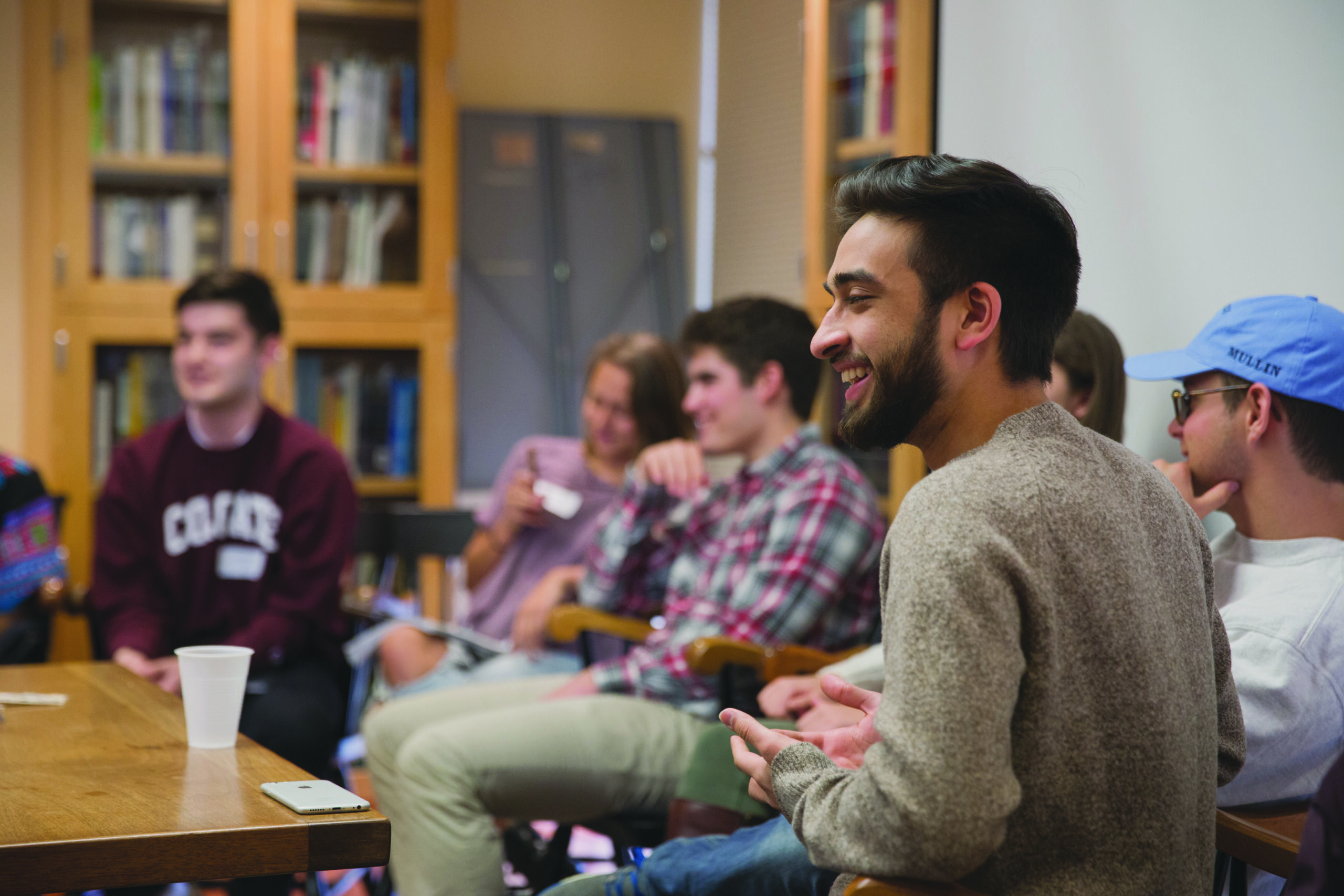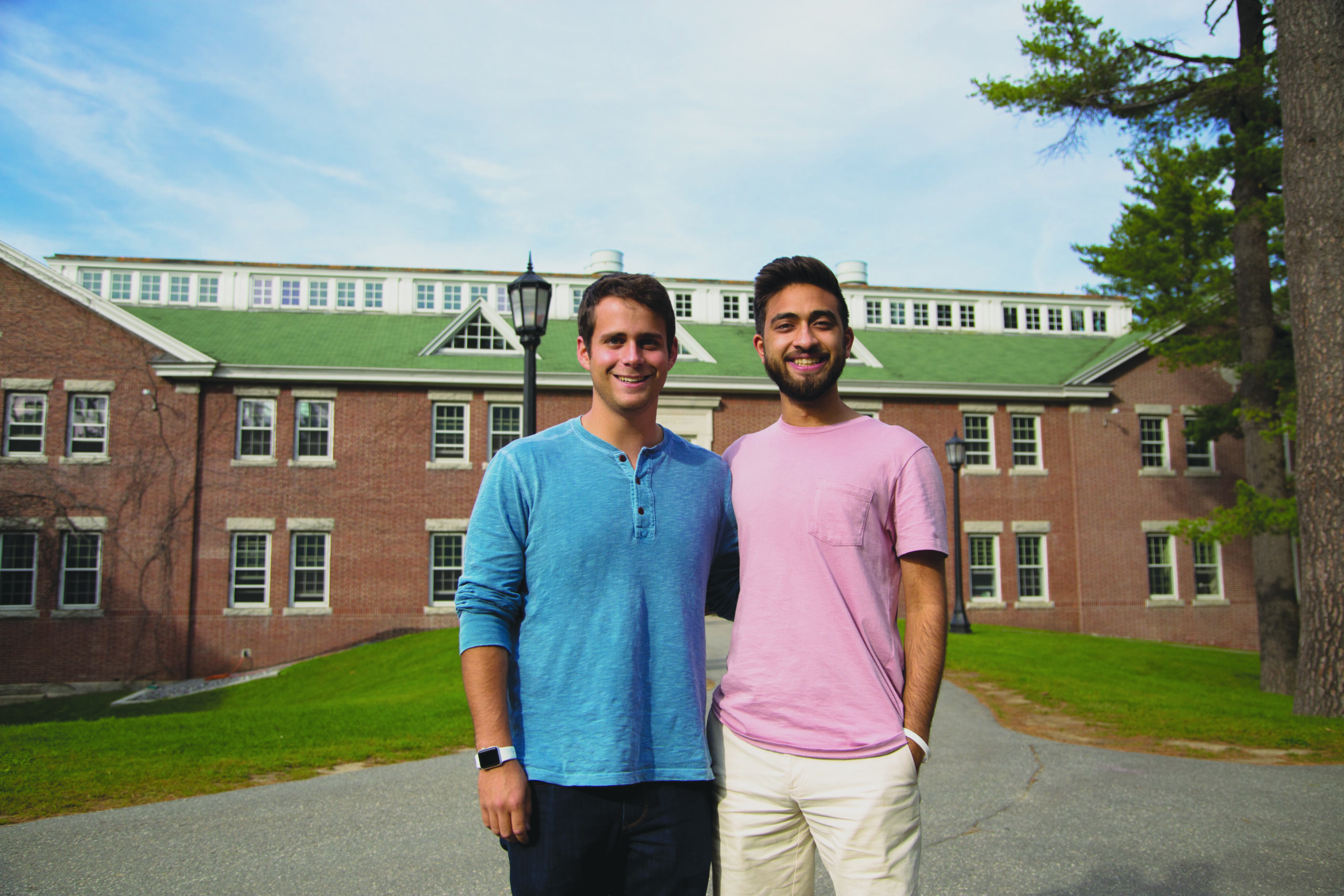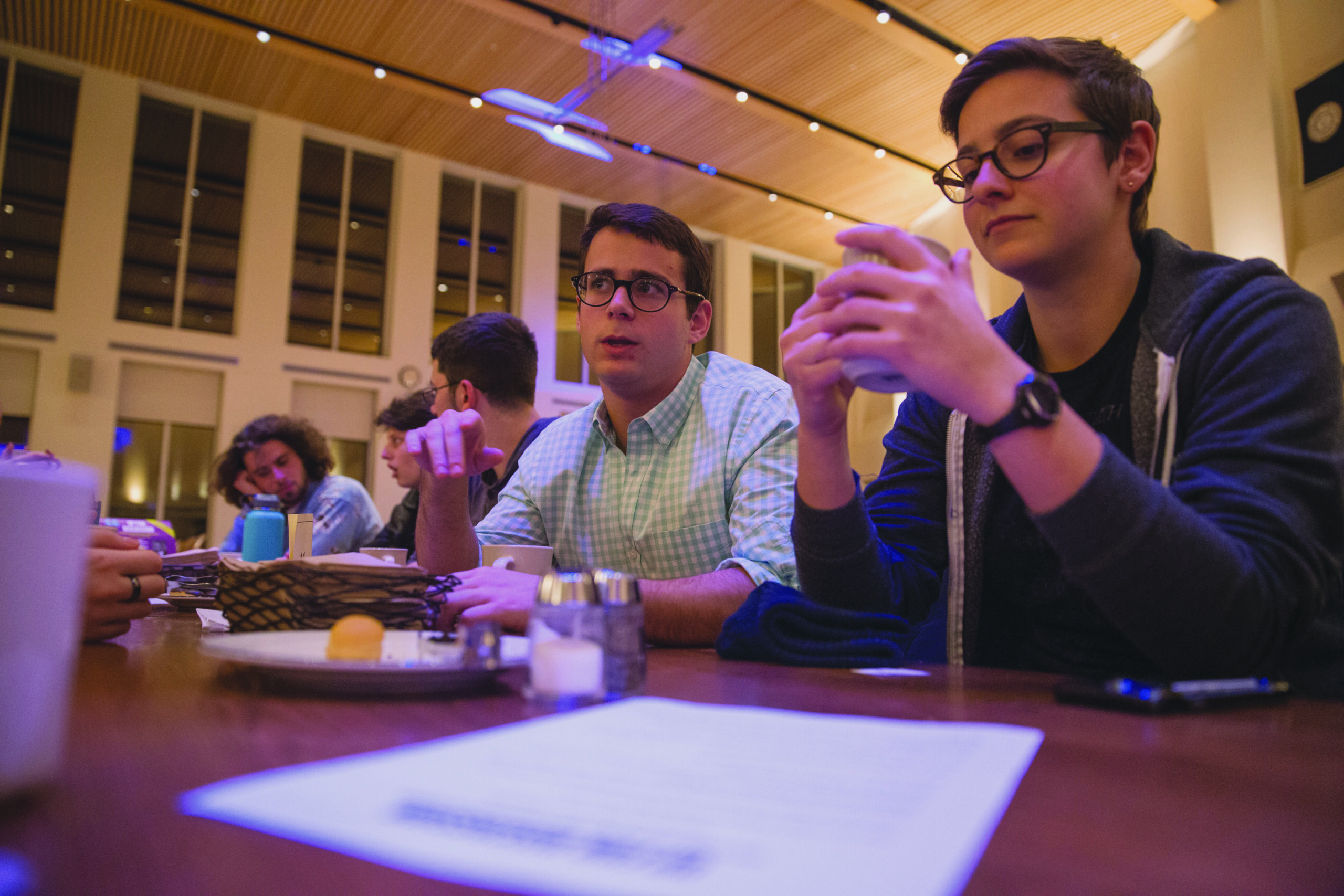BSG leaders discuss future plans, campus issues
President Irfan Alam ’18 and VP for BSG Affairs Ben Painter ’19 sit down with the Orient
September 22, 2017

The Bowdoin Orient Editors-in-Chief, Sarah Drumm ’18 and Harry DiPrinzio ’18, spoke with Bowdoin Student Government President Irfan Alam ’18 and Vice President for Student Government Affairs Ben Painter ’19 about plans for the upcoming year, off-campus housing, the Committee for Diversity and Inclusion and more. The following interview has been edited for length and clarity.
Harry DiPrinzio (HD) ’18: You guys have a big platform this year and you have a lot of power. What are the plans? What are you going to do with it?
Irfan Alam (IA) ’18: The things that we thought were really important coming into this year were addressing the social and alcohol policies we have at Bowdoin, thinking about how we can renovate and create new facilities to accommodate student interests and lastly thinking about how we can improve the student multicultural voice on the BSG assembly. In all three of those ways, we have already taken steps to address those issues and make sure that we have a path forward for each of those different avenues.
Ben Painter (BP) ’19: Another thing that’s taking up most of our headspace at this current moment is the restructuring of the BSG. We had this NESGOV [NESCAC Student Government] conference at the end of last year where we invited other schools here—other student governments from NESCAC schools and Colgate—to exchange ideas and everything. And we realized that we all had different structures and maybe ours was not the most effective. So we did a pretty hefty restructuring within our constitutional limits (because we couldn’t make a constitutional change) and that’s what we’ve been working on right now. The positions are more focused, we have a better relationship with more areas of the administration … I’d say we’ve made awesome progress on that.
Sarah Drumm (SD) ’18: Part of your platform was that you wanted to loosen some of the social and alcohol policy restrictions so on-campus living is more attractive. Do you think this is a realistic goal? Have you made any steps towards it?
IA: I think that trying to address the social and alcohol policies is absolutely a realistic goal. And now we have an entire working group of students and faculty to discern how best to move forward with that. That’s going to provide a recommendation to the administration that Ben is directly involved in. And I think the administration knows there are things that are antiquated with our social and alcohol policies. First of all, we need to make this online. Does it make sense that people are going in and doing it on paper? It needs to be more flexible so upperclassmen who are usually above the drinking age can just throw their event together and not have security check three times throughout the event. How do we discern between what’s a party and what’s not a party? Is it loudness? Is it level of alcohol? All these things the administration realizes: that as campus has evolved, they haven’t really changed and evolved those rules as well, which is why they have agreed to create this working committee because they are taking it seriously.
SD: What are both of your opinions on the fact that the College maintains this right to determine who can and cannot live off-campus? That was in Dean [of Student Affairs Tim] Foster’s email—it was very unclear.
IA: Yeah, that’s a great question. We debated that question a lot [in] the working group. I want to really stress that we did not all see eye to eye on this working group committee. People came from very different perspectives, and that was a really important question that we wanted to address from the beginning: does the administration have a role in deciding this? Some of the students’ perspectives [were] ‘I am paying to come to Bowdoin and I don’t want to live on-campus. I shouldn’t have to.’
But then Bowdoin also has an interest in preserving residential community. We had lots of data talking about—and what we evaluated was—what was the effect on the community? What were students’ perspectives on the effect on the community from more people living off campus than they ever had? What was faculty’s perspective? What was the administration’s perspective? What was [the neighborhood] perspective?
So the community changes and warps dramatically when people leave this residential environment and that’s what makes this different from a big public school in a major city. People come here for a different experience. People come here for a tight-knit community. [In] ensuring that Bowdoin can provide that experience—to me, it makes sense that Bowdoin has the ability to say, given all these different conditions about how we need to keep relations with the community, how we need to ensure the values of a residential community—that they can discuss ways to control how people live on and off-campus—but not without taking students’ interests into account.

HD: You wanted to create an executive committee for diversity and inclusion….
IA: I think what’s really interesting is that President Rose, after this huge year-long review, decided that there should be a Senior Vice President for Diversity and Inclusion on his executive committee. And I think that speaks to the fact that Bowdoin has evolved dramatically [since] when the BSG structure was formed. I think it makes sense that this conversation wasn’t even included [then].
But now that’s at the forefront of all of our mindsets—to make sure that that voice is represented—is something that we have to think about. So what we’ve done already is we’ve increased the responsibility of the Multicultural Representative—who’s going to be Osa [Omoregie] this year. So he’s going to be a Director of Diversity and Inclusion on the assembly, which means that he’s leading his own committee of liaisons, who will be non-voting members on his committee that meets every week. So that has liaisons like Gender and Sexual Violence that meets with Lisa Peterson [Associate Director of Gender Violence Prevention and Education]and has liaisons like Sexuality and Gender … that meets with Kate Stern [Associate Dean of Students for Diversity & Inclusion and Co-Director of the Center for Sexuality, Women & Gender]. And so these different liaisons are going to work together and [the international rep], who meets with Dean Khuong [assistant dean of first year students].
One of the things we heard as feedback from last year was that the multicultural representative was not able to do as much as she wanted because she didn’t have a team of people dedicated to helping her do those tasks. So having a committee of people that you can delegate work to—that you can work as a team to collaborate on — will be a really great way to more effectively bring issues of diversity and inclusion to the assembly.

BP: Right now it’s not elevated to a vice president position yet. Even if we wanted to, we couldn’t have done that yet, because it needs a vote of the whole school to amend our constitution. What we’ve done doesn’t require any constitutional change. But we’re not just going to slap it on the table for everyone to vote on because this is going to be a whole process of evaluating this structure, really working with Benjamin Harris [director of the Student Center for Multicultural Life] and Mo [Nur, vice president for academic affairs on BSG]. We’re not going to be too speedy with doing anything because we want to make sure we do it right.
SD: So we started off the year with a bias incident on campus. How do you two see your role in combating bias incidents in our community?
IA: There are a lot of steps that are involved in this decision. First, if a bias incident, or something of that nature, were to happen—something already did—first, we convene to talk about the different ways that we would respond and whether we should respond. When the bias incident happened, we got together and had an emergency executive team meeting, because that’s all that was assembled of the BSG, and said: “Do we respond? What does it mean to respond? How would we respond? What would it mean to respond in each of these different options?” Ben and I are going to have two completely different views in what we should do, so we have to talk about [it], the assembly has to talk about it. The executive team has to talk about it. So that’s step one.
Step two: I think that one important thing that this assembly and the executive team really believes in is that students on this campus have to feel safe—have to feel included. So if students who identify as being LGBTQI do not feel safe on this campus, that is something that BSG has to consider. That is important to us as people. And we were elected to this position to care about the students on this campus, so if there are students on this campus who feel unsafe because their identities are being attacked, we are not going to overlook that. Period.
How we are going to move forward and respond to each specific instance is a collective conversation. I am really really proud of the executive team and the way that we handled this situation. We talked to different student leaders, religious group leaders, different Af-Am leaders. We spoke with Kate Stern. We sent an email to like eight different administrators outlining different options. We did this in like 48 hours and then executed something. I think when these things happen—and they hopefully won’t, but we can assume that this is just not going to be the end of it—having a precedent of creating a conversation, keeping students’ safety and interests in mind, at the forefront, but then considering all the different repercussions of each potential option at the forefront.
IA: I think encouraging political activism in all spectrums is so important … In whatever way students feel like they can [be politically active] with whatever opinions and beliefs they have. Our futures are at stake—we have to take ownership of that—100 percent. But in a very short amount of time we had to get together and be like—“Is this political?” And we decided, no. There are students on this campus who are going to feel [its effects]. This is a community where we have each others’ backs—I’ve had first years, as a ResLife [proctor], who I know are going to be affected by this, and they need to hear from our student body leaders that we are here for you and you are here to stay.

Comments
Before submitting a comment, please review our comment policy. Some key points from the policy: